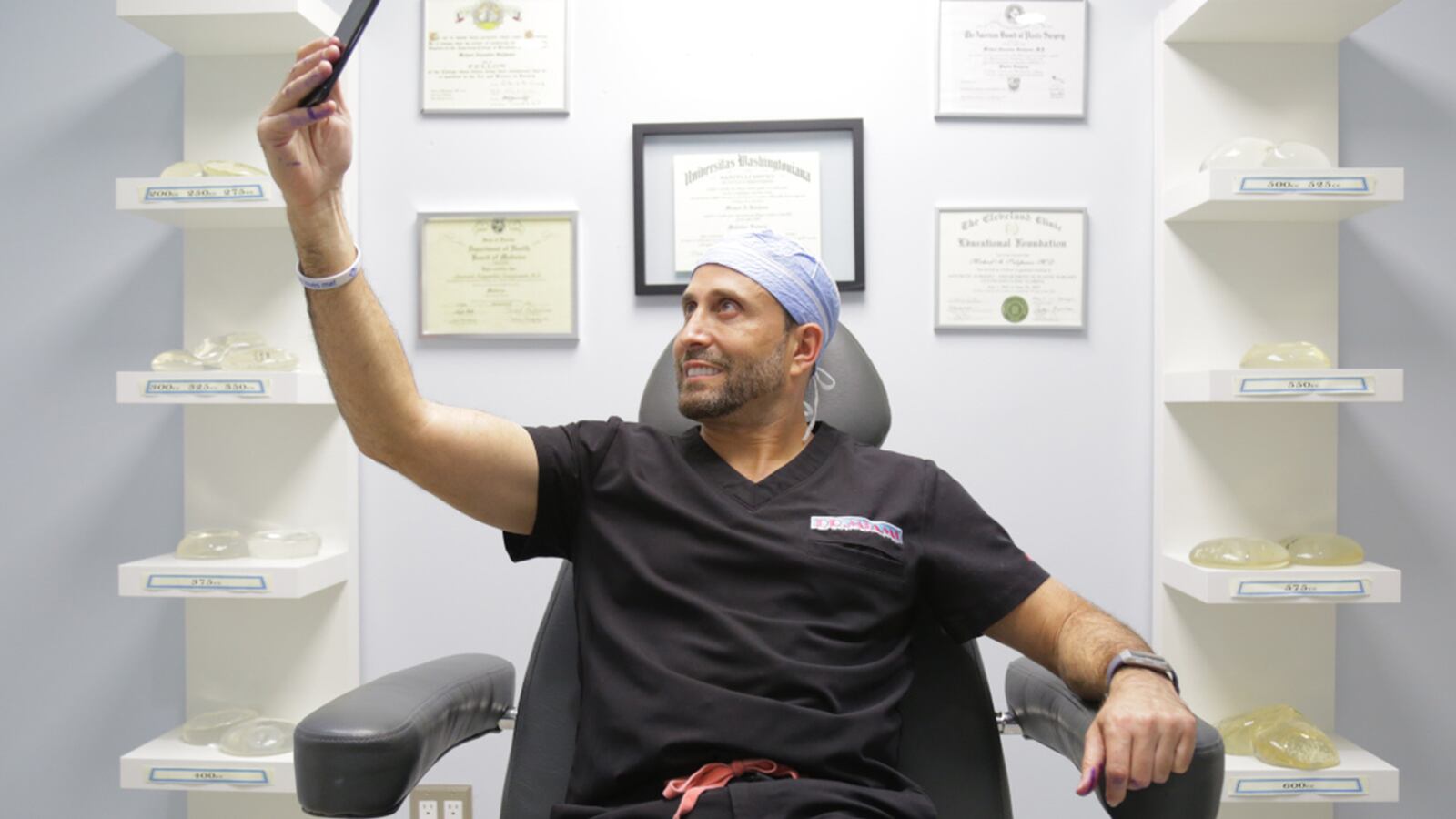In the 1992 black comedy Death Becomes Her, Meryl Streep plays an actress on the verge of aging out of Hollywood who chances upon the elixir of youth. Streep unlocks the ability to live forever and never age, but that doesn’t spare her body from other indignities. As she and her also-immortal rival, played by Goldie Hawn, fight against time, they break their necks, decimate their fingers, shoot perfect circles through their stomachs—only to get patched back up by their reconstructive-mortician lover. By the end, the two women are rotting effigies of their former selves, their body parts breaking off at the slightest provocation. The moral is fairly straightforward: sometimes the underside of beauty is disgusting.
If the message had gotten lost in the last 30-odd years, Canadian director Jean-Simon Chartier’s documentary, They Call Me Dr. Miami, which is now streaming on discovery+, is a pretty effective reminder. The 80-minute feature follows the life of Michael Salzhauer, a plastic surgeon better known as Dr. Miami, who’s built a following for himself by livestreaming his cosmetic procedures on social media. Salzhauer is a plastic surgery evangelist—dedicated, he says, to making the world more beautiful inside and out and using the tools of the internet to spread his gospel. But the central paradox of his online presence is that it’s very much not beautiful, so much as wholly revolting. The Snapchat feed that made him famous is a jarring blend of ecstatic group choreography and close-ups of bloodied butts halfway through a silicone implant surgery.
Salzhauer, who grew up in New York City, opened his Miami practice in 2003. There are more than a few plastic surgery clinics in the area, to put it mildly, and to compete, Salzhauer decided to go wild on advertising. (“Marketing makes the world go ‘round,” he told Miami New Times in 2012). For him, that meant bringing people behind the scenes of surgeries—offering free procedures in exchange for publicity. Salzhauer has a manic, Mad Hatter energy and his videos are impossible to tear your eyes away from, in part because they’re so disgusting.
The gimmick turned Salzhauer into something of a minor celebrity, someone fans approach on the street and who gets namechecked on rap tracks. But it also created some problems at home—in addition to doing rhinoplasties on camera in costume, Salzhauer is a husband and father of five kids, all of whom have lukewarm-to-cold feelings about his marketing strategies and all of whom, like Salzhauer himself, practice Orthodox Judaism. Between photoshoots of swollen breast implants outlined in surgical marker, the doctor leads a conservative, deeply religious life. He observes the Sabbath; he wears a yarmulke. In several scenes, Salzhauer wraps tefillin straps around his arm seven times and recites blessings.
Chartier tries to make Salzhauer’s faith the central tension of the film—a moral crisis over his participation in America’s obsession with perfect bodies and desire to be a good man in the eyes of God. It doesn’t quite work, partly because Salzhauer doesn’t seem that torn up about the cognitive dissonance. The main catalyst for the crisis—a series of deaths at nearby plastic surgery practices—seems shoehorned in during the latter part of the movie. Salzhauer briefly explains his efforts at butt implant activism—a publicity blitz to show the procedure botched elsewhere in Miami does not have to be fatal. But Chartier speeds right through it, making it hard for the arc to land with any impact.
In trying to force the faith narrative, the director skims some of the uglier and weirder aspects of Salzhauer’s career. In 2008, for example, he wrote a children’s book called My Beautiful Mommy, about a girl whose mother gets a nose job, breast implants, and a tummy tuck. The following year, he made an iPhone app—a precursor to the face-altering apps that seem to go viral every few months—where users could simulate surgeries on photos of themselves. Most controversially, in 2012 he produced a music video called “Jewcan Sam, A Nose Job Love Song,” in which a Jewish teen tries to woo a girl by getting a nose job. The video landed him a denouncement from the Anti-Defamation League and investigation from the American Society of Plastic Surgeons.
Just two years ago, the doctor had his Snapchat permanently deleted after he uploaded footage of a penis enlargement—a controversial procedure only recently approved by the FDA.
In some respects, the movie is about as subtle as its subject—it starts and ends, for example, with a quote from Guy Debord’s Society of the Spectacle. But its strengths lie in occasional slyness. In one scene, after Salzhauer’s daughter monologues about the hollowness of social media fame, the camera cuts to footage of her dad, dressed up in a fake cape and crown for his next Snapchat shoot. In another moment, Salzhauer explains why he’s not a narcissist—while wearing a shirt with his own face on it. In the final moments of the film, Salzhauer oversees a different kind of surgery: a bris. Dr. Miami may not have appreciated the camera’s irony. On Feb. 11, the day the documentary aired, he had set his Instagram—with its 1.6 million followers—to private.


